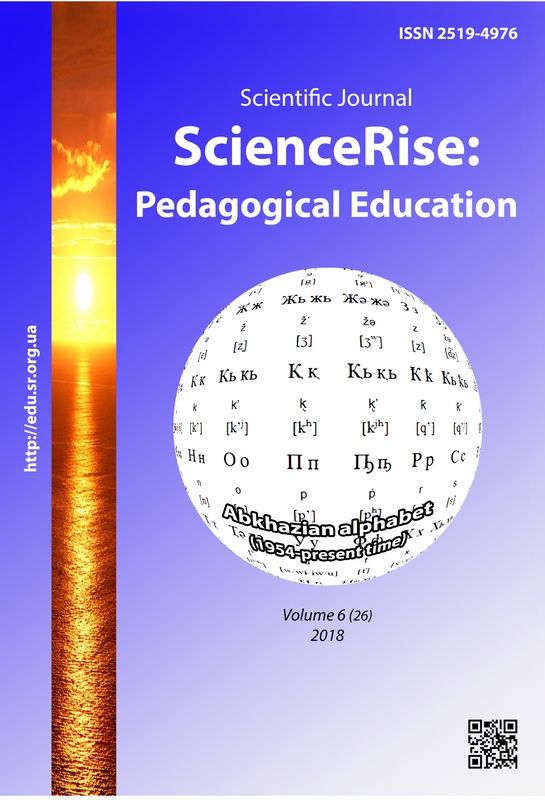Analysis of European Experience in solving modern problems in education and science
DOI:
https://doi.org/10.15587/2519-4984.2018.140642Keywords:
key competences, integration of education system and science, European qualificationsAbstract
Normative documents of the European Union in the field of education and science are analyzed, including the EU Framework Program for updated key competencies and establishment of European Qualifications Framework for lifelong education. The need to combine education within the lifelong learning process at all levels, the definition of processes, strategies and plans concerning youth, employment, social integration and research policies in this area is determined. The importance of ensuring the autonomy of universities in the development of curricula and the choice of forms of education, promotion of the development of general competencies is stated. Basic requirements of the Strategy for a reasonable, sustainable and comprehensive growth of Europe 2020 are named, results of research on knowledge, skills and competences of future specialists demanded by Europe in 2030 and further are presented. The key trends of the EU policy in the field of education and culture, the EU “Erasmus +” program and Ukraine's participation in the EU “Eastern Partnership” initiative, improvement of intercultural understanding, civic participation and ethical awareness, as well as ensuring equitable access to higher education in a united and inclusive society are determined. Worldwide, including the European Higher Education Area, experience of solving educational problems has confirmed the thesis about the importance of integrating competencies of all types, as each of them contributes to a successful life in a knowledge-based society.
It is summed up that general knowledge of languages, education, ability to quantitative thinking and awareness in the field of information and communication technologies is the necessary basis for learning, and education for the sake of knowledge includes the whole educational activity.
Measures are identified and the goals for ensuring comprehensive and sustainable development, social cohesion and further enhancement of the democratic culture of the European Union countries are set out. In order to progressively develop the European Higher Education Area, it is necessary to intensify interdisciplinary and cross-border cooperation, as well as to develop inclusive and innovative approaches to learning and teaching
References
- European Space in Higher Education (1999). General Declaration of the Ministers of Education of Europe. Bologna, 19.06.1999. Available at: http://zakon5.rada.gov.ua/laws/show/994_525.
- On core competences for lifelong learning (2006). Recommendation No. 2006/962/EC of the European Parliament and of the Council (EC). 18.12.2006. Available at: http://zakon3.rada.gov.ua/laws/show/994_975
- Establishing a European Qualifications Framework for Lifelong Learning (2008). Recommendation No. 2008/C111/01 of the European Parliament and of the Council 23.04.2008. Available at: http://zakon2.rada.gov.ua/laws/show/994_988/print-1509974692923373.4.
- Communication from the Commission. Making a European Area of Lifelong Learning a Reality (2001). Brussels. Available at: http://www.europarl.europa.eu/meetdocs/committees/cult/20020122/com(2001)678_en.pdf
- Tuning Methodology. Tuning. 2018. Available at: http://www.unideusto.org/tuningeu/tuning-methodology.html
- EUROPE 2020. A European strategy for smart, sustainable and inclusive growth. URL: http://www.ceceurope.org/wp-content/uploads/2016/01/008-10_CSC_Briefing_EU_2020_Strategy.pdf
- Bakhshi, H., Downing, J. M., Osborne, M. A., Schneider, P. (2017). The future of skills employment in 2030. Available at: https://www.nesta.org.uk/sites/default/files/the_future_of_skills_employment_in_2030_0.pdf
- ANNEX to the Proposal for a Council Recommendation on Key Competences for Lifelong Learning (2018). Brussels. Available at: https://ec.europa.eu/education/sites/education/files/annex-recommendation-key-competences-lifelong-learning.pdf
- Key trends of EU policy in the field of education and culture, EU program "Erasmus +". Available at: https://ukraine-eu.mfa.gov.ua/ua/ukraine-eu/sectoral-dialogue/education
- PARIS COMMUNIQUE (2018). Paris. Available at: http://www.ehea2018.paris/Data/ElFinder/s2/Communique/EHEAParis2018-Communique-final.pdf
- On Education (2017). The Law of Ukraine No. 2145-VIII. 05.09.2017. Available at: http://zakon3.rada.gov.ua/laws/show/2145-19
- Concept of development of digital economy and society of Ukraine for 2018–2020 years (2018). The Law of Ukraine No. 67-р. 17.01.2018. URL: http://zakon3.rada.gov.ua/laws/show/67-2018-%D1%80/page
- Rashkevich, Yu. M. (2014). The Bologna process and the new paradigm of higher education. Lviv: Lviv Polytechnic Publishing House, 168.
- Key competencies for lifelong learning 2018 – Digital competency (2018). Available at: dystosvita.blogspot.com/2018/01/2018.html?m=1
Downloads
Published
How to Cite
Issue
Section
License
Copyright (c) 2018 Svitlana Tolochko

This work is licensed under a Creative Commons Attribution 4.0 International License.
Our journal abides by the Creative Commons CC BY copyright rights and permissions for open access journals.
Authors, who are published in this journal, agree to the following conditions:
1. The authors reserve the right to authorship of the work and pass the first publication right of this work to the journal under the terms of a Creative Commons CC BY, which allows others to freely distribute the published research with the obligatory reference to the authors of the original work and the first publication of the work in this journal.
2. The authors have the right to conclude separate supplement agreements that relate to non-exclusive work distribution in the form in which it has been published by the journal (for example, to upload the work to the online storage of the journal or publish it as part of a monograph), provided that the reference to the first publication of the work in this journal is included.








